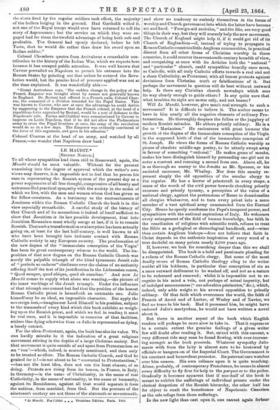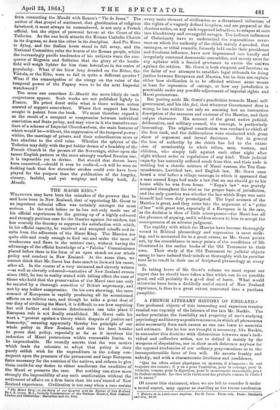LE MAUDIT..
[SECOND Noxicx.]
To all whose sympathies lead them still to Romeward, again, the Maudit should be most valuable. Without for the present examining into the degree of approval which the writer's own views may deserve, it is impossible not to feel that he proves his ease in representing the Romish system of the present day as a power suppressive of all free thought, compressive of all hearty and untrammelled practical sympathy with the society in the midst of which we live, with the men and women whom God has given us for fellow-creatures. As a testimony to the encroachments of Jesuitism within the Roman Catholic Church the book is in this view especially remarkable. A careful study of the history of that Church and of its monachism is indeed of itself sufficient to show that Jesuitism is its last possible development, that into Jesuitism Romanian] must wholly merge at last, if it is to remain Romish. That such a transformation or absorption has been actually going on, at least for the last half-century, is wall known to all who have been brought into intimate contact with Roman Catholic society in any European country. The proclamation of the new dogma of the " immaculate conception of the Virgin" has been its great contemporary witness to the world. The im- position of that new dogma on the Roman Catholic Church was surely the palpable triumph of the blind tyrannous Jesuit rule of " perinde ac cadaver" obedience over the claims of an authority offering itself the test of its justification in the Lirinensian canon, " Quod semper, quod nbique, quod ab omnibus." And now Le Maulit comes to supply what alone was wanting,—the picture of the inner workings of the Jesuit triumph. Under the influence • of that triumph one cannot but feel that the position of the honest Roman Catholic priest is henceforth an untenable one. Julio himself may be an ideal, an impossible character. But apply the sovereign test,—imagine our Lord Himself in his position, subject to the trammels of every kind which this book exhibits as weigh-. ing upon the Romish priest, and which we feel in reading it must -be real ones, and it is impossible to conceive of that faultless, sinless One dying otherwise than as Julio is represented as dying, a lonely outcast.
For the ultra-Protestant, again, the book has also its value. We can hardly mistake in it the indication of a great religious movement stirring in the depths of a large Christian society. But that movement is quite outside of and apart from Protestantism as an " ism"—whieh, indeed, is scarcely mentioned, and then only to be treated as effete. The Roman Catholic Church, and God be praised for it !—is not about to be •' converted to Protestantism," —has not the least idea, does not run the least chance, of so doing. Protests are rising from its bosom, in France, in Italy, in Germany—in the name of Christianity, in the name of real Catholicity, in the name of nationality, in the name of humanity, against its Romishness, against all that would separate it from the nations, from mankind, from God. But the protests of the nineteenth century are not those of the sixteenth or seventeenth,
......NN.,0....„. • Le Maudit. Par l'Abb6 • * * Troisitme Edition. Paris. 1864.
and show no tendency to embody themselves in the forms of worship and Church government into which the latter have become set and fixed. "Foreign-aid societies," and the like, are very good things in their way, but they will scarcely help the new movement. The Church of England might help it, if it could get rid of its Church of Englandism—if, instead of trying to propagate in Roman Catholic countries little Anglican communities, in practical dissent from all other forms of Christian worship in those countries, it could recover its seventeenth-century breadth of view, and recognizing at once with its Articles both the " national " and "particular" church, could sympathize heartily once more, as Catholic, with all truly Catholic efforts towards a real and not a sham Catholicity, as Protestant, with all honest protests against deviations from Christian truth or falsifications of it. But perhaps the movement in question will do beat without outward help. Is there any Christian church nowadays which sees its way clearly enough to guide others 9 Is any quite sure that what troubles its sight are motes only, and not beams?
Will Le Maudit, however, give much real strength to such a movement? It is difficult to believe it. The author seems to have in him nearly all the negative elements of ordinary Pro-
testantism. He thoroughly despises the follies or the jugglery of modem Romish miracles. He abhors priestly celibacy. He is a foe to " Marianism." He caricatures with great humour the growth of the dogma of the immaculate conception of the Virgin in the supposed birth of that of the immaculate conception of St. Joseph. He views the forms of Roman Catholic worship as pieces of obsolete middle-age poetry, -to be utterly swept away in favour of something " rational." He makes game of monks, makes his hero distinguish himself by persuading one girl not to enter• a convent and rescuing a second from one. Above all, he is as thorough an enemy to the Jesuits as Mr. Spooner, or his anointed successor, Mr. Whalley. Nor does this enmity re- present simply the old opposition of the secular• clergy to the regular. He has a horror of priestcraft in every shape, a sense of the worth of the civil power towards checking priestly excesses and priestly tyranny, a perception of the value of a national clergy, against the pretensions of Rome to denationalize all clergies whatsoever, and to turn every priest into a mere member• of a vast spiritual army commanded from the Eternal City. Hence he openly condemns the Pope's temporal power, and sympathizes with the national aspirations of Italy. He welcomes every enlargement of the field of human knowledge, has faith in the conciliation of religions with scientific truth, refuses to treat the Bible as a geological or chronological handbook, and—wiser than certain Anglican bishops—does not believe that faith in Christ depends on the authentic inspiration of every word of a text doubtful on many points nearly 2,000 years ago.
If, however, we look for something deeper than this we shall be disappointed. The book is a bold and passionate pleading for a reform of the Roman Catholic clergy. But some of the most deadly errors of Roman Catholic theology cling to the writer amidst all his boldness, in particular that conception of sin as a mere outward defilement to be washed off, and not as a nature to be redeemed and renewed ; whilst it is impossible not to re- cognize in his mind a vein, not perhaps of actual impurity, but of indulged sensuousness (" ces adorables penitentes," &c.), which, indeed, only adds weight to his avowed opposition to priestly celibacy. Of that faith which overcomes the world, the faith of Francis of Assisi and of Luther, of Wesley and of Xavier, we find no trace in his book. Had it possessed him, he might have endured Julio's martyrdom, he would not have written a novel about it.
But there is another aspect of the book which English readers will perhaps be more slow to take in. That it expresses to a certain extent the genuine feelings of a given writer few will doubt after reading it. But, mixed with this current, a very different tide may soon be found flowing, with ever-increas- ing strength as the book proceeds. Whatever sympathy Julio meets with from the laity is almost sure to be bestowed by officials or hangers-on of the Imperial Court. The Government is his constant and benevolent protector. Its paternal care watches over him unseen. His own reliance upon it is quite touching. Alone, probably, of contemporary Frenchmen, he seems in almost
every difficulty to fly first for help to the parquet or to the police.
Gradually it becomes apparent that if one-half of the book is meant to exhibit the sufferings of individual priests under• the clerical despotism Of the Romish hierarchy, the other half has for object to exalt the beneficence of Napoleonic Cassarism as the sole refuge from those sufferings.
In the new light thus cast upon it, one cannot again forbear from connecting the Maudit with Renan's " Vie de Jesus." The author of that gospel of sentiment, that glorification of religious falsehood, it must always be remembered, is not only a Frenoh official, but the object of personal favour at the Court of the Tuileries. As the one book attacks the Roman Catholic Church in its dogmas, so does the other in its discipline. And Pio Nono Is dying, and the Italian hosts stand in full array, and the National Committee rules the hearts of the Roman people, whilst" the increasingly pacific tendencies of his subjects warn the con- queror of Magenta and Solferino that the glory of the battle- field will weigh lighter for him than heretofore in the scales of 'popularity. What if the blow long dreaded on the Rhine, the • Vistula, or the Elbe, were to fall in quite a different quarter ? What if the emancipation of the clergy on the ruins of the temporal power of the Papacy were to be the next Imperial watchword ?
The more one considers Le Maudit the more likely do such conjectures appear. Such works are not published lightly in France. No priest (bust write what is there written unless assured of support somewhere. Where that support has been sought is patent from the book. We must therefore regard it as the result of a compact or compromise between individual conviction and State policy, and may view in it the tentative out- lines of a scheme of Imperial Churchsreform, the main features of which would be—without, the suppression of the temporal power ; within, the marriage of priests, and their subordination more or less absolute to the civil ruler. Whether the sphynx of the Tuileries may daily with the yet bolder dream of a headship of the French Church in the person of the Sovereign, either upon the tamer English pattern or the more strongly marked Russian one, it is impossible yet to divine. But should that dream have been conceived,—should it ever be realized,—it will be seen on looking back that few shrewder strokes could ever have been played for the purpose than the publication of the lengthy, clumsy, faultful, and yet weighty and telling book, Le Maudit.































 Previous page
Previous page